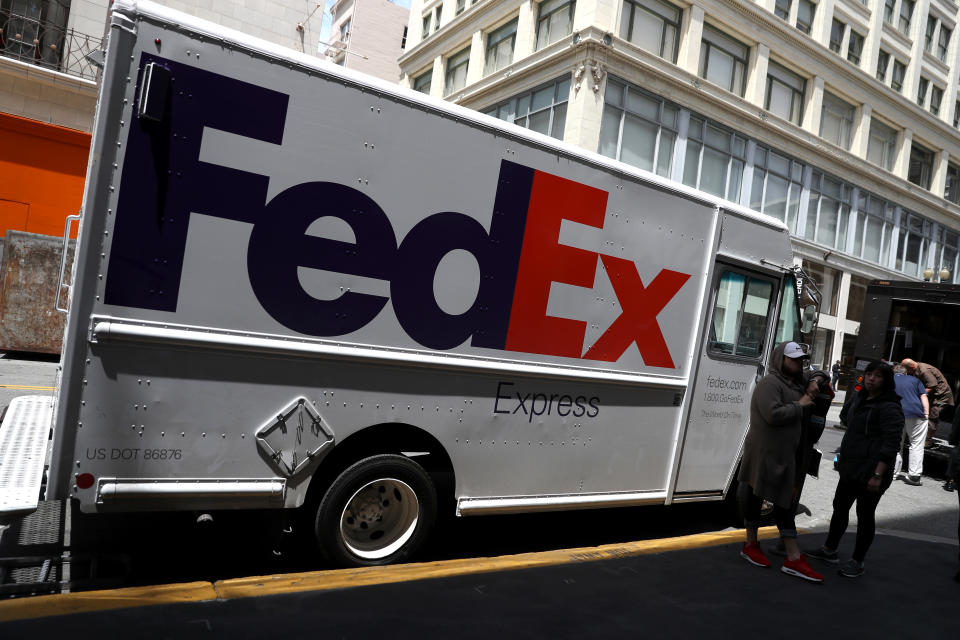FedEx CEO says trade war surprised him like a 'Mike Tyson' punch in the face
FedEx’s (FDX) top executive assailed current U.S. trade policy as more protectionist measures threaten to upend the courier company’s business plans and take a bite out of its bottom line.
“It reminds me a bit about that old adage of Mike Tyson that everybody has got a plan until they get hit in the mouth,” FedEx CEO Fred Smith said. “So clearly, we’ve been very disappointed over the last few years with the assumptions that we made on the growth in international trade, particularly with the Trump administration.”
Smith made his remarks during a call with investors Tuesday in response to Barclays analyst Brandon Oglenski’s inquiry into FedEx’s growth strategy, especially relating to the company’s Express international air shipping business.
FedEx Express’ operating income came under pressure in the fourth quarter, and the company declined to project fiscal 2020 earnings results for the segment. FedEx said trade disputes and low global growth rates created “significant uncertainty” for the business unit.
“The United States policy since 1934 with Roosevelt and Secretary of State Cordell Hull was to expand international trade,” Smith said. “And now we have a huge dispute where the United States is basically become protectionist defined as, ‘I’ll make everything I need in my own borders. I don't need to import things and quite frankly don't particularly need to export them.’”
Smith also acknowledged what he considered to be flaws with other countries’ trade policies as well, which have further confounded global trade flows.
“We don’t agree with the Chinese position on trade either – and have been very vocal about that – which is mercantilist,” he added.
In its fourth-quarter earnings release Tuesday, FedEx reported that its results for the current fiscal year would be negatively impacted by “weakness in global trade and industrial production.” The company guided toward a mid-single-digit percentage point decline in fiscal 2020 diluted earnings per share, after adjusting for certain retirement plans and integration expenses related to its acquisition of TNT Express.
For the fiscal fourth quarter, FedEx reported better-than-expected results on the top and bottom lines, delivering adjusted earnings per share of $5.01 on revenue of $17.8 billion.
‘Virtually impossible task’
FedEx has also taken issue with other dealings in U.S. trade policy.
The Memphis, Tennessee-based company earlier this week filed a lawsuit against the U.S. Commerce Department requesting that the government “be permanently enjoined from enforcing the export administration regulations against FedEx in circumstances when the company has no knowledge that the contents of the shipment are subject to the [Export Administration Regulations],” FedEx’s general counsel said.
In a court filing, FedEx said that the export restriction rules “essentially deputize FedEx to police the contents of the millions of packages it ships daily even though doing so is a virtually impossible task, logistically, economically, and in many cases, legally.” FedEx argues that it should not be liable in the event that it accidentally ships products violating the Trump administrations’ restrictions.

The lawsuit, which does not specifically name Chinese telecommunications company Huawei in its court filing, took place after the U.S. government in May added Huawei to a list of entities barred from receiving U.S. technology without a license from the Commerce Department. Shortly thereafter, Huawei complained that FedEx had delivered several of its packages to incorrect addresses, sparking an investigation into FedEx by China.
On Tuesday, FedEx CEO Smith disputed claims that the incidences with Huawei were the primary motivation for the decision to file the lawsuit.
“The Huawei packages were only peripherally involved in this lawsuit that we filed,” he said. “And in fact, it goes back many, many years, which is in the lawsuit itself and it concerns not contraband, which many people have confused the lawsuit as concerning. It concerns import and export controls as administered by the Department of Commerce.”
Commerce Secretary Wilbur Ross disagreed with FedEx’s position in an interview with Fox News Tuesday, saying, “The regulation states that common carriers cannot knowingly ship items in contravention of the entity list or other export control authorities. It does not require a common carrier to be a policeman or to know what’s in every package.”
Smith noted that five new companies were added to the Commerce Department’s Entity List of companies last Friday “with extraordinarily opaque requirements” around export regulation. Smith said fines for violations currently total $250,000 per package.
—
Emily McCormick is a reporter for Yahoo Finance. Follow her on Twitter: @emily_mcck
Read more from Emily:
Tech companies like Lyft want your money – not ‘your opinion’
Levi Strauss shares jump more than 30% above IPO price at open
Facebook sued by Trump administration for alleged ‘discriminatory’ ad practices
Boeing 737 Max groundings ‘pressure’ U.S. economic data: Wells Fargo
Follow Yahoo Finance on Twitter, Facebook, Instagram, Flipboard, LinkedIn, and reddit.

